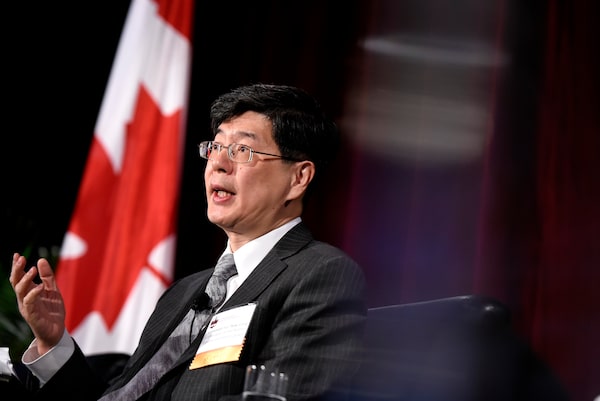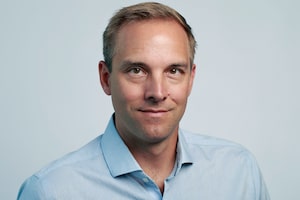
Cong Peiwu speaks at the Ottawa Conference on Security and Defence on March 4, 2020. The Chinese ambassador to Canada warned the Trudeau government on Thursday not to grant asylum to Hong Kong residents fleeing a widely criticized national-security law imposed by Beijing.Justin Tang/The Canadian Press
Prime Minister Justin Trudeau says he doesn’t wish to get into an escalating war of words with China, but vowed to keep pressing the Communist superpower to cease its crackdown on civil rights in Hong Kong, its imprisonment of largely Muslim minorities and its unlawful detention of two Canadian men.
Mr. Trudeau was asked Friday how he would respond to a veiled threat from China’s envoy to Canada, who suggested that the “health and safety” of 300,000 Canadians living in Hong Kong could be jeopardized if Ottawa continued to grant political asylum to residents fleeing the former British colony.
“We don’t want to escalate but we will continue to ensure that Canadians know that we are standing for our rights, for our principles, for our values,” Mr. Trudeau told a news conference.
Ambassador Cong Peiwu told reporters Thursday that Beijing finds it unacceptable that Canada recently took in two Hong Kong pro-democracy dissidents as refugees. He also took strong exception to a call from nearly 60 MPs and senators to shelter more Hong Kong residents fleeing China’s national-security law.
“We strongly urge the Canadian side not to grant so-called political asylum to those violent criminals in Hong Kong, because it is interference in China’s domestic affairs, and certainly it will embolden those violent criminals,” he said.
Mr. Cong indicated that any further action to shelter Hong Kong residents could have consequences for the many Canadians living in the Asian financial hub. He also warned that Canada would face a “strong reaction” from Beijing if the Canadian Parliament passed a motion condemning genocide against the Uyghur minority in Xinjiang province.
The Prime Minister made clear on Friday that Canada will not be silenced by Chinese threats.
“As a government … we will stand up loudly and clearly for human rights all around the world, whether it is talking about the situation faced by the Uyghurs, whether it is talking about the very concerning situation in Hong Kong, whether it is calling out China for its coercive diplomacy,” Mr. Trudeau said. “These are things we will continue to do.”
“We will make sure that China knows that not only are we standing up for human rights and calling on the safe return of the two Michaels, who have been arbitrarily detained, but we stand with allies around the world … who share these concerns.”
Conservative Party Leader Erin O’Toole called the ambassador’s remarks a “barely veiled threat” that was “unbecoming of his office” as envoy to Canada.
He called on the ambassador to retract his remarks and apologize. If he declines to comply, Mr. O’Toole said, the Canadian government should expel him.
“It was of the kind of tone and tenor one would expect from someone seeking protection money – not someone who is the official emissary of a member of the United Nations Security Council,” Mr. O’Toole said.
Global Affairs Canada officials called in the ambassador on Thursday to reprimand him for his comments.
Canada-China relations have been in a deep freeze since December, 2018, when the RCMP arrested senior Huawei executive Meng Wanzhou at the Vancouver airport on an American extradition request. U.S. authorities accuse Ms. Meng and other company executives of lying to banks so that they would clear transactions with Iran through the United States, despite U.S. sanctions against doing business with Iran.
In apparent retaliation, China arrested and imprisoned Canadians Michael Spavor and Michael Kovrig on allegations of espionage, and blocked imports of some Canadian agriculture goods. The Prime Minister, who has in the past been reluctant to criticize China, accused Beijing on Tuesday of resorting to “coercive diplomacy.”
Asked on Thursday if China was threatening 300,000 people in Hong Kong who hold Canadian passports, the ambassador replied: “That is your interpretation.”
But a threat is “undoubtedly” what Mr. Cong’s comments imply, said Alvin Y.H. Cheung, an affiliated scholar with the U.S.-Asia Law Institute at New York University.
History, he said, suggests that retaliatory consequences could include new administrative obstacles “that systematically disfavour Canadians and Canadian companies,” or surveillance and harassment – perhaps even temporary abduction – of junior staff at the Canadian consulate, similar to what happened to British employee Simon Cheng.
“In more extreme cases, [there could be] attacks on prominent individuals by rent-a-thugs that the police seem to have no inclination to investigate,” said Mr. Cheung, who is Canadian.
The Globe and Mail spoke on Friday with Canadians working in Hong Kong as bankers, consultants, lawyers and entrepreneurs. Some expressed fear that Mr. Cong’s comments presaged the disappearance of Canadians, similar to the seizure of Mr. Kovrig and Mr. Spavor, whose detention has been called “hostage diplomacy” by the Canadian government. Many refused to speak publicly out of fear that they risked personal or professional reprisal.
Others shrugged off the remarks.
“I do not think that this will bother any law-abiding resident of Hong Kong,” said Jean-François Harvey, a Canadian lawyer who is worldwide managing partner for Harvey Law Group, which specializes in immigration and taxation.
“I don’t read his statement as a threat,” added Simon Young, a Canadian barrister who is associate dean of research with the faculty of law at the University of Hong Kong.
For others in Hong Kong, however, the Chinese ambassador added to a rising sense of uncertainty in a city where Beijing has imposed a national-security law that has been used to criminalize speech and arrest democracy advocates.
“Between the national-security law and the Canadians being grabbed – and now we have this thinly veiled threat to the health and safety of Canadians – the accumulation of risk factors starts to weigh on people,” said Andrew Work, president of the Canadian Club of Hong Kong.
Some have already left, including Davin Wong, a Canadian who was acting president of the Hong Kong University Students' Union before abandoning his studies there last year in the midst of lengthy protests. Mr. Wong and people close to him were being followed, and he worried that he was placing others at risk.
He’s now in Canada, studying law at the University of British Columbia. He is critical of the “coercive attitude” from Beijing.
Mr. Cong’s comments amount to “an attempt by China to see how much power they have over Canadian policy and decision making. And I think it is very important right now for Canada not to give in,” Mr. Wong said.
“It cannot be more apparent and clear to Canada that we have to review our approach toward our relationship with China.”
Our Morning Update and Evening Update newsletters are written by Globe editors, giving you a concise summary of the day’s most important headlines. Sign up today.
 Robert Fife
Robert Fife Steven Chase
Steven Chase Nathan VanderKlippe
Nathan VanderKlippe